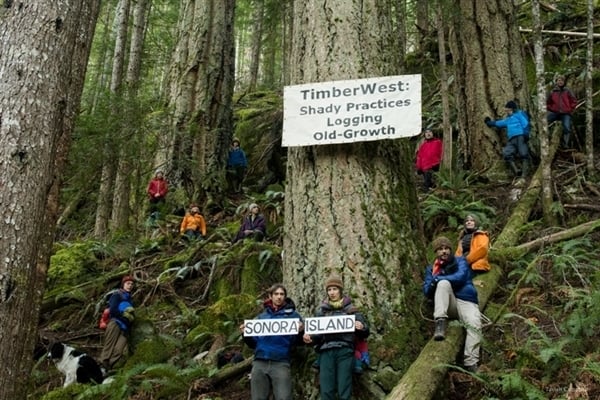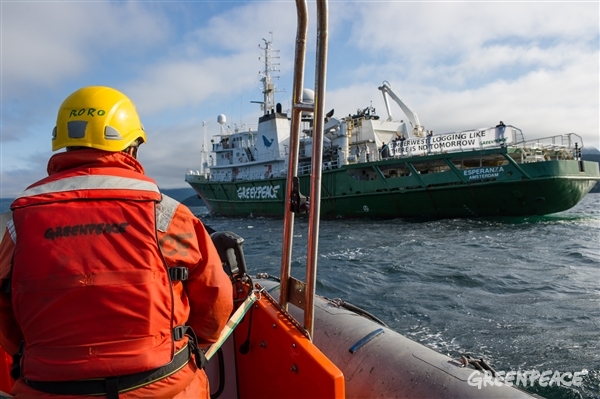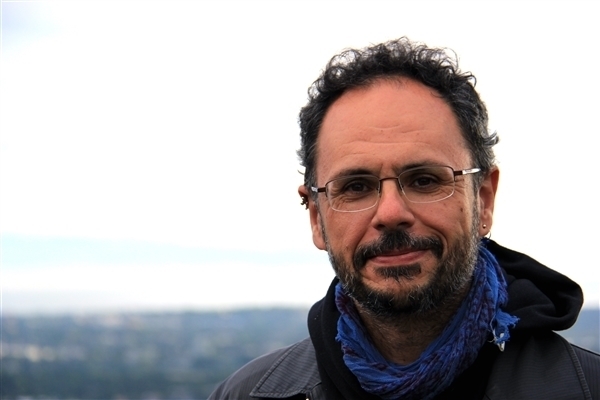
It was exactly 2 years ago today that I published a blog on Sonora Island – the southernmost end of the Great Bear Rainforest, within the traditional territories of Kwakwaka’wakw and Coast Salish peoples. In that blog I described the struggle the local community and environmental organizations have had to improve the logging practices of TimberWest Forest Corporation – especially their curious methods of identifying old-growth forests on the ground. I wrote that this was of particular concern as this is a region where less than 5% of many forest ecosystems remains in old growth conditions, and where the majority of ecosystems are globally endangered.
Since that original blogpost there has been good news and bad news.
First the good news: TimberWest agreed to a temporary harvest moratorium on six contentious forest blocks that I described previously in that blog, while it undertook to redefine old-growth and develop reserve designs to set aside rare old growth ecosystems. It worked closely with the local community and that is great. Peachy.

Now the bad news. That temporary moratorium on the six contentious blocks is just that temporary. And, it only constitutes a mere 0.2% of the total area of TimberWest’s tenure (in its Tree Farm License 47).
And now the really bad news. Recent analysis shows that as we move towards implementing stricter logging regulations in 2015, TimberWest has dramatically accelerated its rate of logging in the southern Great Bear Rainforest part of its tree farm license over the past five years. They have logged over one million cubic metres more (the equivalent of a million telephone poles) than they have been allocated as an average Annual Allowable Cut in the five year period (from 2010 to 2014). The company has logged more than 4,400 hectares of rainforest in this area since 2009, 11 times the area of Vancouver’s Stanley Park. This is particularly concerning given that TimberWest does not currently have a plan to reserve and restore these endangered ecosystems and the species that depend on them. Indeed, in the past 5 years, more than 50% of TimberWest’s logging has occurred in areas that were identified five years ago as priorities for landscape reserves. Not only is this not consistent with the spirit and intent of Ecosystem-Based Management (and is also contrary to what their senior executive team committed to us in a 2011 letter), but also goes against the wishes and aspirations of the region’s First Nations (the leadership of these Nations have been in dialogue with TimberWest on their rate of logging and how it precludes other activities and visions for their territories, but that has gotten them nowhere).
It is for this reason, that Greenpeace along with ForestEthics Solutions and Sierra Club BC have once again gone public with our concerns (read our Press Release here). We gave TimberWest the benefit of the doubt over the past two years to get things back on track through ongoing negotiation and engagement, only to be shocked and dismayed with our finding that their logging has accelerated considerably in the region while they have been talking with us.

To emphasize our concern, yesterday we deployed our ship Esperanza to send TimberWest a strong message that their recent practices of logging as if ‘there is no tomorrow’ is entirely unacceptable given the groundbreaking and solution-oriented system of Ecosystem-Based Management that we all have worked tirelessly over the last two decades to implement. Our ship was at Sonora Island where TimberWest operates when we dropped our banner. We had a delegation of representatives from various coastal First Nations. Their drumming and singing added to the poignancy and increased my determination to be part of the collaborative effort to succeed in protecting and restoring the area to the towering old growth forests that once blanketed this region of the Great Bear Rainforest.
And so this I promise you, reader: it will not take another two years of talking and logging before you hear from me again on TimberWest. Stay tuned…
(Read our Press Release and Backgrounder).
 Eduardo Sousa is senior forests campaigner for Greenpeace Canada working with First Nations, the provincial government, the forest products industry and environmental allies towards safeguarding the Great Bear Rainforest of coastal British Columbia and Clayoquot Sound on Vancouver Island.
Eduardo Sousa is senior forests campaigner for Greenpeace Canada working with First Nations, the provincial government, the forest products industry and environmental allies towards safeguarding the Great Bear Rainforest of coastal British Columbia and Clayoquot Sound on Vancouver Island.
